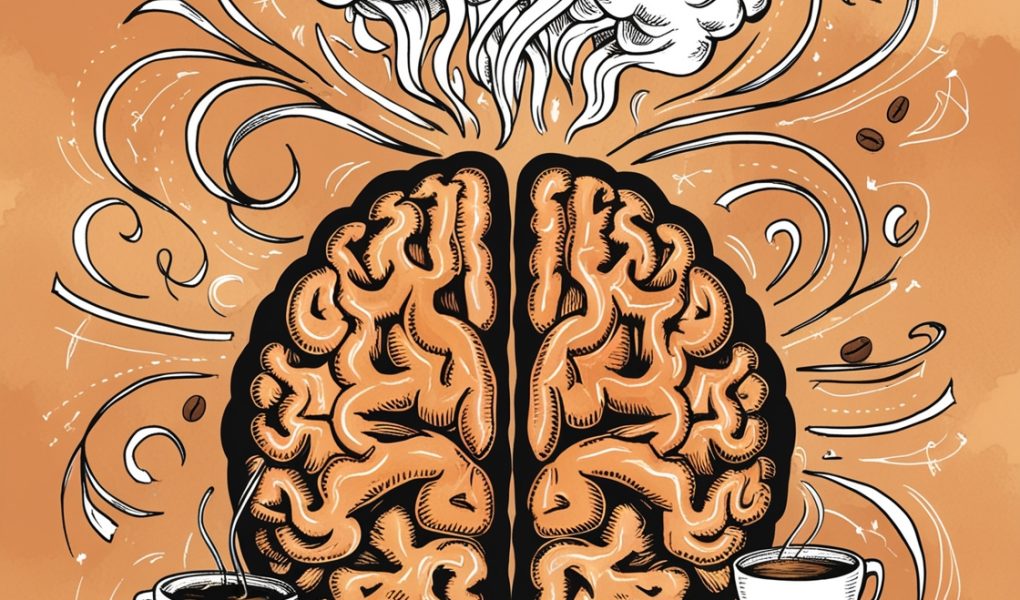Coffee is more than just a morning ritual; it’s a fascinating beverage that significantly impacts brain function. With its rich aroma and invigorating taste, coffee has become a staple for millions worldwide, but its effects extend far beyond simple enjoyment. Research has shown that caffeine, the primary active ingredient in coffee, acts as a powerful stimulant that enhances alertness and concentration.
As we delve into the science behind how coffee affects our cognitive abilities, we’ll explore its potential benefits and drawbacks. From boosting memory to reducing the risk of neurodegenerative diseases, the relationship between coffee and brain health is both intriguing and complex. Let’s take a deep dive into the ways coffee interacts with our minds and what that means for our daily lives.
1. The Science Behind Coffee
Coffee’s effects on the brain begin with its most famous ingredient: caffeine. This natural stimulant, found in coffee beans, acts as a central nervous system enhancer. When consumed, caffeine is quickly absorbed into the bloodstream and reaches the brain within minutes, where it blocks the action of adenosine, a neurotransmitter that promotes sleep and relaxation. By inhibiting adenosine, caffeine increases the release of other neurotransmitters like dopamine and norepinephrine, which contribute to heightened alertness, improved mood, and enhanced cognitive function.
Studies have shown that moderate coffee consumption can improve reaction time, attention, and overall cognitive performance. For example, a study published in the journal Psychopharmacology found that caffeine can significantly enhance attention and memory recall (Haskell et al., 2005). Moreover, research from the Journal of Alzheimer’s Disease indicates that regular caffeine intake may help protect against cognitive decline as we age.
Understanding the science behind coffee helps us appreciate its profound impact on our mental performance. However, as with many things, moderation is key. Too much caffeine can lead to jitteriness, anxiety, and disrupted sleep patterns, which may counteract the benefits. Balancing your coffee consumption can maximize its positive effects while minimizing any drawbacks.
For more in-depth insights into the effects of caffeine, consider exploring studies from sources like the National Institutes of Health and the American Journal of Clinical Nutrition.
2. Cognitive Benefits of Coffee
Coffee is more than just a comforting beverage; it offers a host of cognitive benefits that many people might not realize. One of the most notable effects of caffeine is its ability to enhance alertness and focus. Research has shown that even a moderate intake can improve reaction times and overall cognitive performance. For instance, a study published in the Journal of Psychopharmacology revealed that caffeine consumption significantly boosts attention and working memory (Haskell et al., 2005).
In addition to improving focus, coffee may also play a role in elevating mood. Caffeine stimulates the release of dopamine, often referred to as the “feel-good” neurotransmitter. This can lead to a sense of well-being and increased motivation, making daily tasks feel more manageable. A study from the American Journal of Psychiatry found a correlation between coffee consumption and a lower risk of depression, suggesting that coffee drinkers may enjoy enhanced mood stability (Huang et al., 2014).
Moreover, coffee can provide a temporary boost in learning and memory retention. Research indicates that caffeine enhances memory consolidation, meaning that information learned shortly before consumption may be better retained. A study in Nature Neuroscience highlighted this effect, demonstrating that caffeine can improve long-term memory when consumed shortly after learning (Caffeine Enhances Memory Consolidation, 2002).
While coffee offers these cognitive perks, it’s essential to remember that everyone’s tolerance to caffeine varies. Finding the right balance can help you enjoy the benefits without experiencing unwanted side effects. By incorporating coffee mindfully into your routine, you can harness its cognitive benefits to enhance your daily life.
3. Coffee and Memory
Coffee has a fascinating connection to memory, serving as a potential enhancer of cognitive function. Studies indicate that caffeine can improve various types of memory, particularly in tasks that require attention and learning. For example, a study published in Nature Neuroscience demonstrated that caffeine can enhance memory consolidation, which is the process of transferring new information from short-term to long-term memory (Caffeine Enhances Memory Consolidation, 2002). This means that consuming coffee shortly after learning something new might help solidify that information in your mind.
Additionally, research from the Journal of Experimental Psychology found that caffeine can enhance the retention of information, especially when it comes to recall tasks. Participants who consumed caffeine before being tested on their memory exhibited improved recall compared to those who did not (Smit & Rogers, 2000). This suggests that coffee not only helps you stay alert but also boosts your ability to remember details.
Moreover, coffee’s effect on memory isn’t solely limited to short-term benefits. Some studies have hinted at a link between regular coffee consumption and a lower risk of cognitive decline in older adults. Research published in the Journal of Alzheimer’s Disease suggests that caffeine may have protective effects against neurodegenerative diseases, which can include memory-related conditions (López et al., 2013).
In summary, coffee appears to be a valuable ally in enhancing memory and cognitive function. By consuming it mindfully, you can potentially harness its benefits to aid your learning and retention, making it a powerful tool for both students and lifelong learners. For deeper insights into the relationship between coffee and memory, consider exploring studies from Nature Neuroscience and the Journal of Experimental Psychology.
4. Neuroprotective Effects
Coffee doesn’t just offer a delightful pick-me-up; it also holds potential neuroprotective benefits that can safeguard brain health. Research has shown that regular coffee consumption is associated with a reduced risk of developing neurodegenerative diseases such as Parkinson’s and Alzheimer’s. For instance, a study found that individuals who regularly consume coffee can lower their risk of Alzheimer’s disease by about 31% (source).
The protective effects of caffeine may stem from its ability to block adenosine receptors, which play a role in promoting sleep and regulating inflammatory responses in the brain. By inhibiting these receptors, caffeine may help to mitigate inflammation and oxidative stress—two critical factors in neurodegeneration.
Additionally, studies suggest that caffeine can enhance the production of brain-derived neurotrophic factor (BDNF), a protein that supports neuron growth and survival. This increased BDNF levels may contribute to improved cognitive function and long-term brain health.
In summary, coffee not only stimulates your mind in the short term but also may offer lasting protection against cognitive decline. By incorporating coffee into your routine mindfully, you can enjoy its stimulating effects while potentially reaping its neuroprotective benefits.
5. The Role of Antioxidants
Coffee is not only a beloved beverage but also a rich source of antioxidants, which play a crucial role in promoting brain health and overall wellness. Antioxidants help combat oxidative stress caused by free radicals, reducing inflammation and protecting brain cells from damage. Among the various antioxidants found in coffee, hydrocinnamic acids and polyphenols stand out as key players in neutralizing harmful compounds.
Research indicates that these antioxidants contribute to the protective effects of coffee against neurodegenerative diseases, such as Alzheimer’s and Parkinson’s. A study published in the International Journal of Molecular Sciences highlighted that the bioactive compounds in coffee might offer neuroprotective benefits, potentially lowering the risk of cognitive decline (source).
Moreover, coffee is often cited as one of the richest sources of antioxidants in the Western diet, even surpassing fruits and vegetables in some cases. This makes coffee not just a delicious indulgence but also a powerful ally in supporting brain function and health. By enjoying coffee in moderation, you can harness these antioxidant benefits while savoring every sip.
6. Potential Drawbacks
While coffee boasts numerous cognitive benefits, it’s essential to recognize that it can also have potential drawbacks. The most notable concern is caffeine sensitivity, which varies from person to person. For some, even small amounts of coffee can lead to side effects such as jitters, anxiety, and rapid heart rate. Studies show that excessive caffeine intake—generally more than 400 milligrams per day—can lead to insomnia, irritability, and digestive issues (Verywell Health, 2023).
Additionally, coffee can temporarily raise blood pressure, which may pose a risk for individuals with hypertension. Pregnant women, those trying to conceive, or breastfeeding should exercise caution with caffeine consumption, as high intake has been linked to various risks (Mayo Clinic, 2022).
It’s also worth noting that while coffee can enhance mental performance in the short term, reliance on it can lead to dependency, resulting in withdrawal symptoms like headaches and fatigue if consumption is suddenly reduced. Finding a balance is crucial; moderate coffee intake can provide benefits without the adverse effects.
In conclusion, while coffee offers many advantages for brain function, it’s essential to be mindful of how much you consume and to listen to your body. By understanding both the benefits and the potential drawbacks, you can enjoy coffee as a part of a healthy lifestyle.
Final Thoughts
In conclusion, coffee is more than just a beloved beverage; it plays a significant role in enhancing brain function and overall health. Through its key ingredient, caffeine, coffee boosts alertness, improves memory, and may even offer neuroprotective benefits against diseases like Alzheimer’s and Parkinson’s. Additionally, the antioxidants present in coffee help combat oxidative stress, contributing to cognitive longevity.
However, moderation is essential. While coffee can enhance mental performance, excessive consumption may lead to anxiety, sleep disturbances, and other adverse effects. Understanding your individual tolerance and making mindful choices can help you enjoy the cognitive benefits of coffee without the drawbacks.
As you enjoy your next cup, remember that coffee is not just a morning ritual; it’s a powerful ally for your brain.



